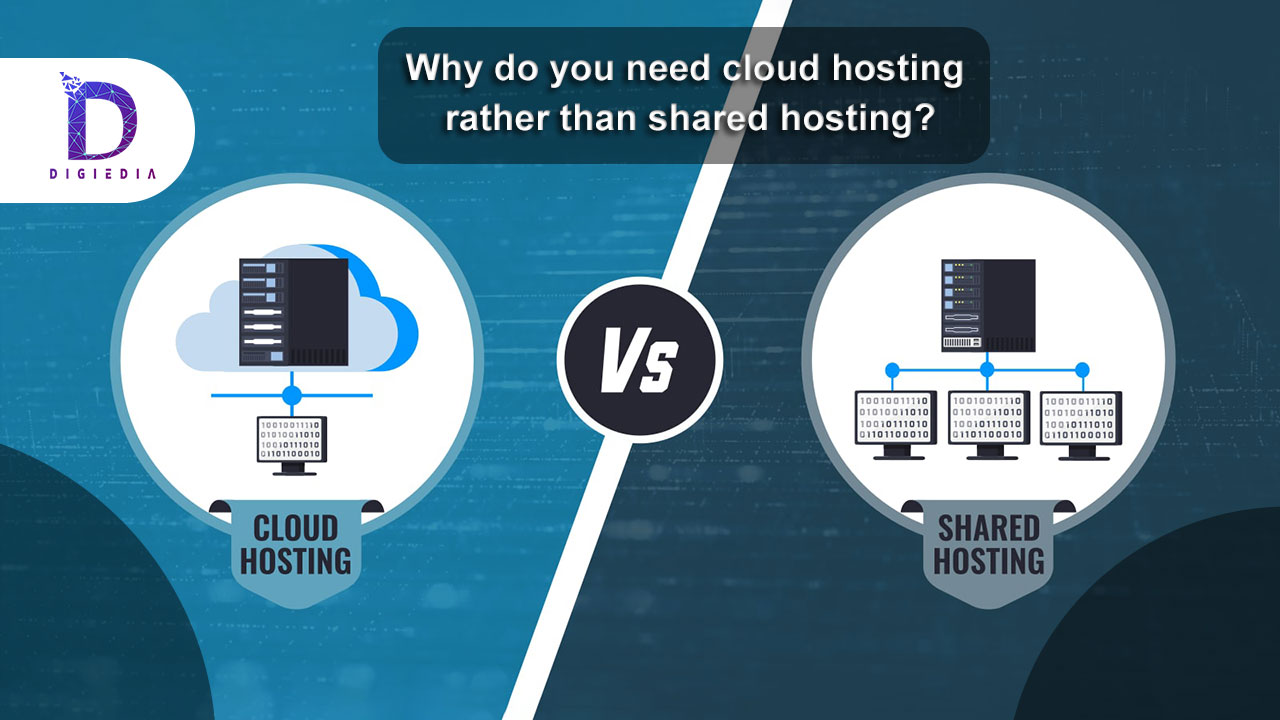
Why do you need cloud hosting rather than shared hosting?
- DIGIEDIA
- Blogs
- 02 May 2022
- No Comments
Why do you need cloud hosting is an important question these days for everyone around us? Cloud hosting is often viewed as a superior option to shared hosting due to its ability to handle large amounts of traffic, increased security protection, and dependability. However, these advantages come at a cost, and most cloud hosting services cost more than shared hosting plans. Cloud hosting, on the other hand, would most likely be the best option for you if you plan to extend your site and need a site with a high-performance rate.
A shared hosting plan, on the other hand, maybe a reasonable alternative for you until you can afford to upgrade if you’re just getting started and have a restricted or non-existent budget.
One of the most important distinctions in those services is the difference between cloud and shared hosting. These two companies provide basic hosting services in comparable ways, but they do so in completely distinct ways. Even while some may argue that one is much better than the other, the type of hosting that is appropriate for your company is mostly determined by your individual needs. Even though shared hosting is less expensive, cloud hosting is significantly more secure and scalable.
“The number of visitors to your site and the amount of money you are ready to invest decide hosting fees,” she explained. You may quickly change or upgrade if you discover that shared hosting does not give you the speed or resources you desire.
Why do you need cloud hosting and how does it operate?
Cloud hosting is a type of web hosting in which numerous servers are joined together to divide the load and keep the site running smoothly during peak traffic periods. If one of the cluster’s servers fails to provide support, another will step in to assist the site.
What exactly is shared hosting and how does it operate?
In shared hosting, multiple websites share the resources of a single physical server. Because other websites share resources, the cost is kept down. Shared hosting, on the other hand, does not provide any website with unlimited resources. Each site is given a specific amount of quota, beyond which the neighbor stops assisting. Any client using the shared hosting platform’s server has access to the host’s databases, monthly traffic, disc space, email accounts, FTP accounts, and other add-ons.
What Is the Difference Between Shared and Cloud Hosting?
Let’s have a look at some of the key differences between Cloud and Shared Hosting.
- Server Resources
- Scalability
- Performance
- Security
- Technical
- Support
- Cost
Server-side resources
Multiple servers pool their resources to support multiple websites under Cloud Hosting. The sites always have enough resources, and if they run out, they can borrow resources from their neighbor’s thanks to the system. On shared hosting, all of the sites share the same resources. Hosting providers limit the number of resources accessible to each site by setting quotas.
Scalability
Cloud Hosting allows you to scale resources quickly and easily because several servers are connected. On the other hand, shared hosting has limited resources and cannot scale quickly. Shared hosting is the worst option for scaling your organization, while cloud hosting is significantly more useful. Further scalability will necessitate the use of dedicated servers.
Performance
The performance of cloud hosting is considerably superior to shared hosting. Shared hosting can’t handle heavy concurrent traffic, however, Cloud Hosting offers the backup capacity to handle such circumstances.
Security
Security is influenced by several factors, one of which is hosting. Why do you need cloud hosting is because it is more secure than shared hosting if all other parameters remained constant?
Many websites consume the resources of shared hosting, so if one of them isn’t set up properly or is at risk, the server could become infected, putting all of the sites at risk.
Technical
A high level of technical knowledge is not required for shared hosting. The hosting provider provides a control panel that greatly simplifies the management of online assets. Why do you need cloud hosting on the other hand is that it demands a substantial amount of cloud computing expertise? Hosting companies also provide managed cloud hosting options. If you know how to set it up and operate it, self-managed cloud hosting is also an option.
Support
The hosting company determines the level of support. Some shared hosting businesses specialize in providing excellent customer support. The bulk of hosting companies offer a wide range of services. They must prioritize help based on the cost of the service.
Cost
Cloud hosting is far more expensive than shared hosting. The cost of shared hosting is calculated on a monthly or annual basis, whereas the cost of cloud hosting is determined by the site’s resource usage.
Shared Hosting vs. Cloud Hosting: Which Is Better for You?
Shared hosting is never an option if you’re in the eCommerce business and have a payment gateway on your website. It cannot be relied upon to be secure or dependable by any powerful eCommerce platform. A dedicated server is best. However, the answer to the question – of why do you need cloud hosting is because it is the most cost-effective option if you don’t want to spend so much money on hosting. Shared Hosting can be a suitable alternative for you if you’re a new blogger who’s just starting started with web development.
